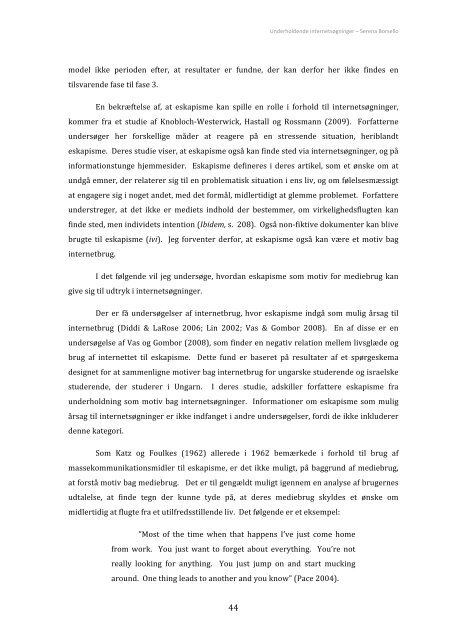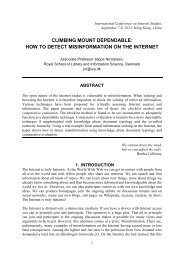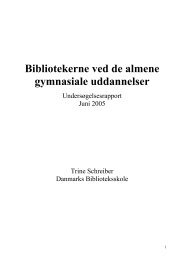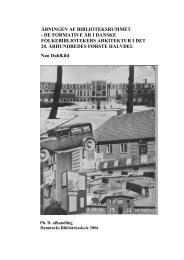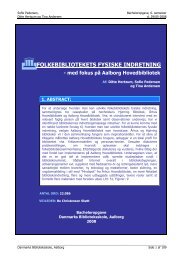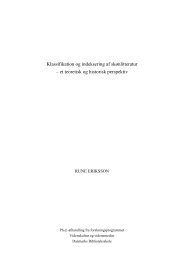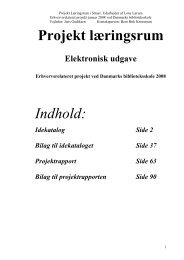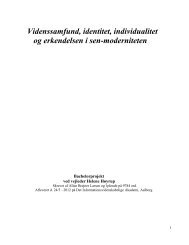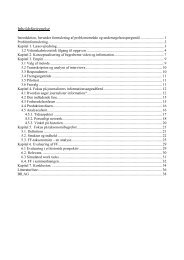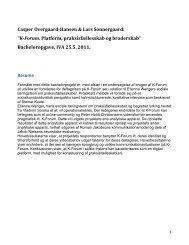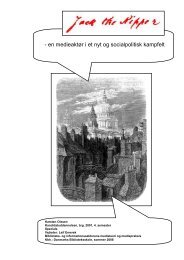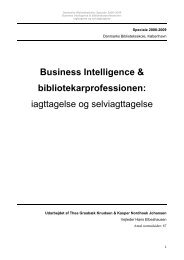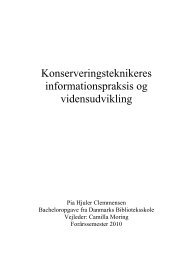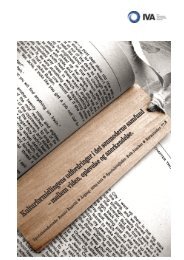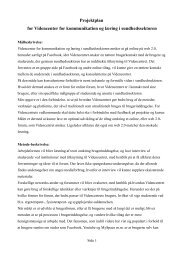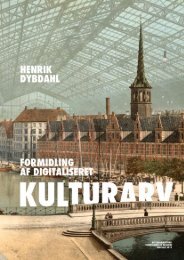Hvorfor er det sjovt at surfe på nettet? - Forskning
Hvorfor er det sjovt at surfe på nettet? - Forskning
Hvorfor er det sjovt at surfe på nettet? - Forskning
Create successful ePaper yourself
Turn your PDF publications into a flip-book with our unique Google optimized e-Paper software.
44<br />
Und<strong>er</strong>holdende int<strong>er</strong>netsøgning<strong>er</strong> – S<strong>er</strong>ena Borsello<br />
model ikke p<strong>er</strong>ioden eft<strong>er</strong>, <strong>at</strong> result<strong>at</strong><strong>er</strong> <strong>er</strong> fundne, d<strong>er</strong> kan d<strong>er</strong>for h<strong>er</strong> ikke findes en<br />
tilsvarende fase til fase 3.<br />
En bekræftelse af, <strong>at</strong> eskapisme kan spille en rolle i forhold til int<strong>er</strong>netsøgning<strong>er</strong>,<br />
komm<strong>er</strong> fra et studie af Knobloch‐West<strong>er</strong>wick, Hastall og Rossmann (2009). Forf<strong>at</strong>t<strong>er</strong>ne<br />
und<strong>er</strong>søg<strong>er</strong> h<strong>er</strong> forskellige måd<strong>er</strong> <strong>at</strong> reag<strong>er</strong>e <strong>på</strong> en stressende situ<strong>at</strong>ion, h<strong>er</strong>iblandt<br />
eskapisme. D<strong>er</strong>es studie vis<strong>er</strong>, <strong>at</strong> eskapisme også kan finde sted via int<strong>er</strong>netsøgning<strong>er</strong>, og <strong>på</strong><br />
inform<strong>at</strong>ionstunge hjemmesid<strong>er</strong>. Eskapisme defin<strong>er</strong>es i d<strong>er</strong>es artikel, som et ønske om <strong>at</strong><br />
undgå emn<strong>er</strong>, d<strong>er</strong> rel<strong>at</strong><strong>er</strong><strong>er</strong> sig til en problem<strong>at</strong>isk situ<strong>at</strong>ion i ens liv, og om følelsesmæssigt<br />
<strong>at</strong> engag<strong>er</strong>e sig i noget an<strong>det</strong>, med <strong>det</strong> formål, midl<strong>er</strong>tidigt <strong>at</strong> glemme problemet. Forf<strong>at</strong>t<strong>er</strong>e<br />
und<strong>er</strong>streg<strong>er</strong>, <strong>at</strong> <strong>det</strong> ikke <strong>er</strong> mediets indhold d<strong>er</strong> bestemm<strong>er</strong>, om virkelighedsflugten kan<br />
finde sted, men indivi<strong>det</strong>s intention (Ibidem, s. 208). Også non‐fiktive dokument<strong>er</strong> kan blive<br />
brugte til eskapisme (ivi). Jeg forvent<strong>er</strong> d<strong>er</strong>for, <strong>at</strong> eskapisme også kan være et motiv bag<br />
int<strong>er</strong>netbrug.<br />
I <strong>det</strong> følgende vil jeg und<strong>er</strong>søge, hvordan eskapisme som motiv for mediebrug kan<br />
give sig til udtryk i int<strong>er</strong>netsøgning<strong>er</strong>.<br />
D<strong>er</strong> <strong>er</strong> få und<strong>er</strong>søgels<strong>er</strong> af int<strong>er</strong>netbrug, hvor eskapisme indgå som mulig årsag til<br />
int<strong>er</strong>netbrug (Diddi & LaRose 2006; Lin 2002; Vas & Gombor 2008). En af disse <strong>er</strong> en<br />
und<strong>er</strong>søgelse af Vas og Gombor (2008), som find<strong>er</strong> en neg<strong>at</strong>iv rel<strong>at</strong>ion mellem livsglæde og<br />
brug af int<strong>er</strong><strong>nettet</strong> til eskapisme. Dette fund <strong>er</strong> bas<strong>er</strong>et <strong>på</strong> result<strong>at</strong><strong>er</strong> af et spørgeskema<br />
designet for <strong>at</strong> sammenligne motiv<strong>er</strong> bag int<strong>er</strong>netbrug for ungarske stud<strong>er</strong>ende og israelske<br />
stud<strong>er</strong>ende, d<strong>er</strong> stud<strong>er</strong><strong>er</strong> i Ungarn. I d<strong>er</strong>es studie, adskill<strong>er</strong> forf<strong>at</strong>t<strong>er</strong>e eskapisme fra<br />
und<strong>er</strong>holdning som motiv bag int<strong>er</strong>netsøgning<strong>er</strong>. Inform<strong>at</strong>ion<strong>er</strong> om eskapisme som mulig<br />
årsag til int<strong>er</strong>netsøgning<strong>er</strong> <strong>er</strong> ikke indfanget i andre und<strong>er</strong>søgels<strong>er</strong>, fordi de ikke inklud<strong>er</strong><strong>er</strong><br />
denne k<strong>at</strong>egori.<br />
Som K<strong>at</strong>z og Foulkes (1962) all<strong>er</strong>ede i 1962 bemærkede i forhold til brug af<br />
massekommunik<strong>at</strong>ionsmidl<strong>er</strong> til eskapisme, <strong>er</strong> <strong>det</strong> ikke muligt, <strong>på</strong> baggrund af mediebrug,<br />
<strong>at</strong> forstå motiv bag mediebrug. Det <strong>er</strong> til gengældt muligt igennem en analyse af brug<strong>er</strong>nes<br />
udtalelse, <strong>at</strong> finde tegn d<strong>er</strong> kunne tyde <strong>på</strong>, <strong>at</strong> d<strong>er</strong>es mediebrug skyldes et ønske om<br />
midl<strong>er</strong>tidig <strong>at</strong> flugte fra et utilfredsstillende liv. Det følgende <strong>er</strong> et eksempel:<br />
”Most of the time when th<strong>at</strong> happens I’ve just come home<br />
from work. You just want to forget about ev<strong>er</strong>ything. You’re not<br />
really looking for anything. You just jump on and start mucking<br />
around. One thing leads to anoth<strong>er</strong> and you know” (Pace 2004).


